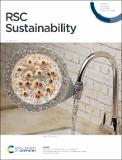Yeast-laden Hydrogel Capsules for Scalable Trace Lead Removal from Water
Author(s)
Gokhale, Devashish; Stathatou, Patritsia M.; Athanasioud, Christos E.; Doyle
DownloadD4SU00052H.pdf (2.724Mb)
Publisher with Creative Commons License
Publisher with Creative Commons License
Creative Commons Attribution
Terms of use
Metadata
Show full item recordAbstract
Trace heavy metals are present in water resources globally, jeopardizing ecosystems and human health. Lead is one of the most prevalent and toxic trace pollutants, with numerous incidents of lead-contaminated drinking water across the United States. Conventional treatment processes fail to remove trace lead from water in a resource-efficient manner. Yeast can effectively remove lead from water via a rapid mass transport process, called biosorption, even when lead concentrations are below 1 part-per-million. Rapid and high lead uptake can enable the application of this inexpensive and abundant biomaterial to water treatment, but scalability is limited by the need to remove any added yeast from water. Here, we scale up a yeast-based treatment process without requiring additional separation steps. Yeast cells are confined within hydrogel capsules that are sufficiently large for easy separation from water by gravitational settling, and sufficiently porous not to limit adsorption capacity and kinetics. The yeast-laden capsules exhibit an uptake capacity of 21 mg g−1, comparable to free yeast under the same conditions, reaching equilibrium within the first 5 minutes of contact. We assess the mechanical robustness of the yeast-laden capsules, and construct a lab-scale proof-of-concept packed-bed biofilter, capable of treating trace lead-contaminated water and meeting USEPA drinking water guidelines while operating continuously for 12 days, to demonstrate the scalability of our approach. By overcoming common separation and structural stability issues that limit scalability of biological water treatment methods, our work offers an innovative and sustainable solution targeting emerging contaminants.
Date issued
2024-05-15Department
Massachusetts Institute of Technology. Department of Chemical Engineering; Massachusetts Institute of Technology. Center for Bits and AtomsJournal
RSC Sustainability
Publisher
Royal Society of Chemistry
Citation
RSC Sustain., 2024,2, 1761-1772
Version: Final published version
ISSN
2753-8125
Collections
The following license files are associated with this item: